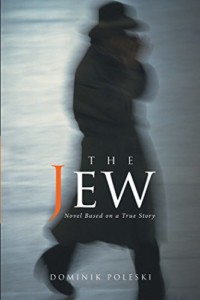Title: The Jew: Novel Based on a True Story
Author: Dominik Poleski
Publisher: Xlibris
ISBN: 9781524583088
Pages: 252
Genre: Historical Fiction
Reviewed by: Dan Macintosh
Pacific Book Review Star
Awarded to Books of Excellent Merit

Dominik Poleski’s story about growing up in a small town Poland in the 60s offers a smart and insightful window into a pivotal point in world history. Centered upon a troubled teenager Alek Brodski, Poleski sets his tale in Eastern Europe well after World War II, and also well before the Cold War’s end. With its rich detail, the reader walks away from this historical novel with a much better understanding of what it must have been like to be the only (known) Jewish family in a small Polish village. Alek forges a close bond with his mother Zofia, mostly because he doesn’t have anybody else to turn to. It’s not until he begins an unlikely relationship with the young prostitute Ela that he finally finds somebody outside of his family bloodline to befriend.
Escapism is one of the major themes running through Poleski’s book. One method Alek uses to attempt to escape his dark and desperate surroundings, for instance, involves taking walks through his village, peering into the first floor of neighborhood residences and imagining what their day-to-day lives might be like. Both Alek and his mom also attempt to migrate to Israel, in a manner of physical escape, after learning Poland might be loosening such emigration restrictions. Lastly, Alek escapes the isolation of being the lone Jew in town by converting to Catholicism, in hopes that an association with the church might finally bring he and his tightknit family the social life they so desperately need.
Although Poleski highlights his home country’s political situation throughout the story, this is not a strictly political work. Nevertheless, he paints a not too pretty picture of communism during this period. Even though it was idealistic, communism never fully delivered on its promises. Despite the Marxian belief that religion is the opiate of the people, the folks in Alek’s world are mostly deeply spiritual. Even before joining the church, Alek experiences deep spiritual doubts. The reader is also left to wonder if Alek’s conversion to Catholicism is truly sincere.
Poleski does a thorough job of creating detailed descriptions of the characters in his book. While the story is never less than compelling throughout, it’s these real life characters that leave the greatest lasting impression. This is also not one of those birth to death life stories. Poleski leaves off before Alek enters full adulthood, so much is left to the reader’s imagination regarding what happens next.
Akin to the best Russian literature of the past, Poleski brings us right smack dab in the middle of what is a fairly exotic lifestyle to most westerners. Even though this story is set in Poland, it describes a culture heavily influenced by the Soviet Union at that time. Through Alek’s eyes, we see a sad picture of many familial relationships. Most of the men drink too much, many physically and verbally abuse their wives and home is oftentimes the most dangerous place to be. The church doesn’t fare much better, as the town priest is portrayed as a womanizing, money-grabbing and untrustworthy spiritual guide.
While the story is many times dark, Alek’s character is this book’s most hopeful character. He’s smart, talented and willing to make life changes that improve his life. The reader hurts with him when he’s abused by town bullies, and then celebrates along with him when he begins his new spiritual journey. His mother Zofia is also admirable in her undying devotion to the welfare of her son.
As this work is based upon real observations Poleski made in his own life, this book is part biography, and part historical fiction. However, no matter how you want to label it, it is a book well with the time it takes to read it. It’s especially troubling to learn about post-World War II anti-Semitism (so soon after the Holocaust took so many Jewish lives, particularly Polish lives). Furthermore, such racism still plagues the world today, which may make you wonder if we’ll ever learn to simply live and let live. Excellently written and should be read by all generations.



Follow Us